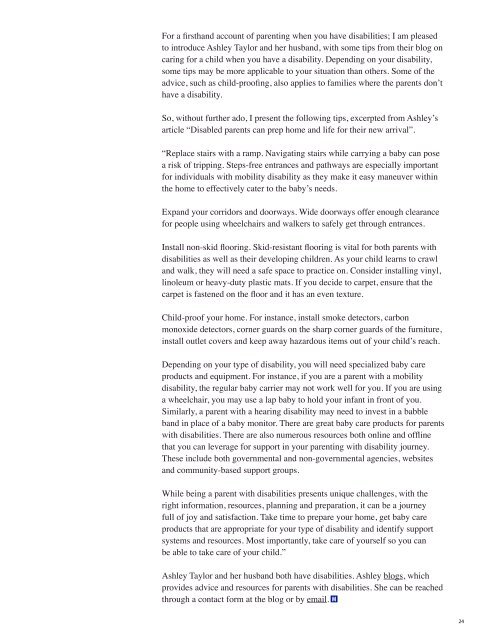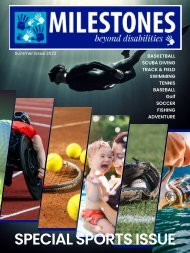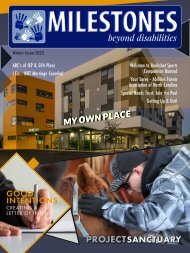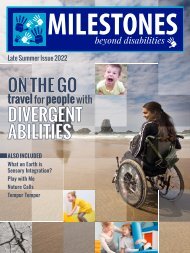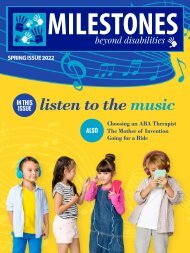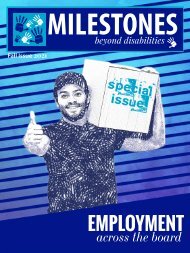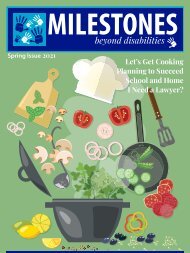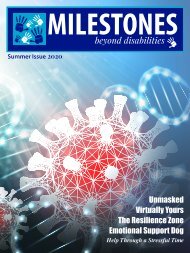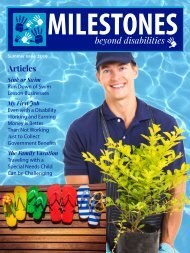Milestones Magazine Fall Issue
Milestones Magazine was developed to help individuals with disabilities and their families achieve and celebrate events and milestones in their lives.
Milestones Magazine was developed to help individuals with disabilities and their families achieve and celebrate events and milestones in their lives.
Create successful ePaper yourself
Turn your PDF publications into a flip-book with our unique Google optimized e-Paper software.
For a firsthand account of parenting when you have disabilities; I am pleased<br />
to introduce Ashley Taylor and her husband, with some tips from their blog on<br />
caring for a child when you have a disability. Depending on your disability,<br />
some tips may be more applicable to your situation than others. Some of the<br />
advice, such as child-proofing, also applies to families where the parents don’t<br />
have a disability.<br />
So, without further ado, I present the following tips, excerpted from Ashley’s<br />
article “Disabled parents can prep home and life for their new arrival”.<br />
“Replace stairs with a ramp. Navigating stairs while carrying a baby can pose<br />
a risk of tripping. Steps-free entrances and pathways are especially important<br />
for individuals with mobility disability as they make it easy maneuver within<br />
the home to effectively cater to the baby’s needs.<br />
Expand your corridors and doorways. Wide doorways offer enough clearance<br />
for people using wheelchairs and walkers to safely get through entrances.<br />
Install non-skid flooring. Skid-resistant flooring is vital for both parents with<br />
disabilities as well as their developing children. As your child learns to crawl<br />
and walk, they will need a safe space to practice on. Consider installing vinyl,<br />
linoleum or heavy-duty plastic mats. If you decide to carpet, ensure that the<br />
carpet is fastened on the floor and it has an even texture.<br />
Child-proof your home. For instance, install smoke detectors, carbon<br />
monoxide detectors, corner guards on the sharp corner guards of the furniture,<br />
install outlet covers and keep away hazardous items out of your child’s reach.<br />
Depending on your type of disability, you will need specialized baby care<br />
products and equipment. For instance, if you are a parent with a mobility<br />
disability, the regular baby carrier may not work well for you. If you are using<br />
a wheelchair, you may use a lap baby to hold your infant in front of you.<br />
Similarly, a parent with a hearing disability may need to invest in a babble<br />
band in place of a baby monitor. There are great baby care products for parents<br />
with disabilities. There are also numerous resources both online and offline<br />
that you can leverage for support in your parenting with disability journey.<br />
These include both governmental and non-governmental agencies, websites<br />
and community-based support groups.<br />
While being a parent with disabilities presents unique challenges, with the<br />
right information, resources, planning and preparation, it can be a journey<br />
full of joy and satisfaction. Take time to prepare your home, get baby care<br />
products that are appropriate for your type of disability and identify support<br />
systems and resources. Most importantly, take care of yourself so you can<br />
be able to take care of your child.”<br />
Ashley Taylor and her husband both have disabilities. Ashley blogs, which<br />
provides advice and resources for parents with disabilities. She can be reached<br />
through a contact form at the blog or by email.<br />
M<br />
24


